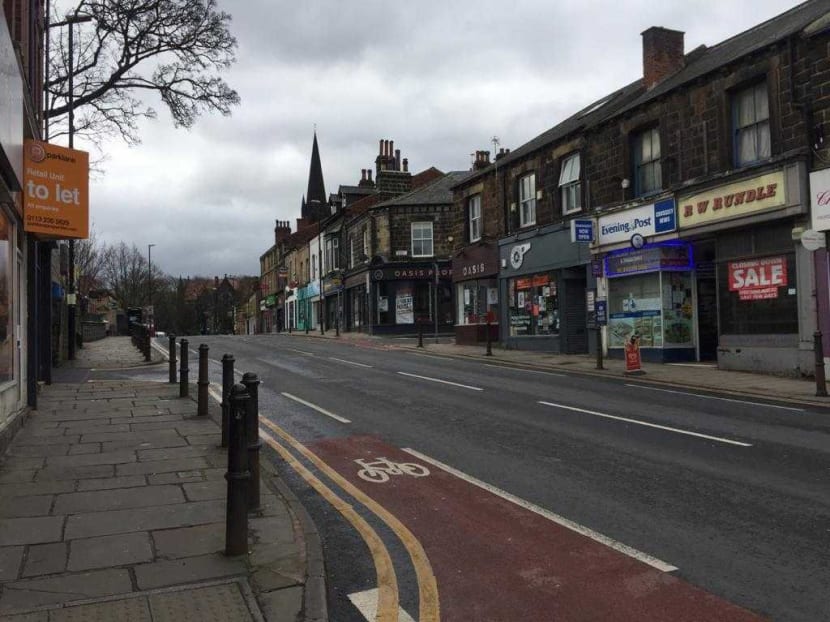‘It’s like a ghost town’: Some Singaporeans stay put in locked-down UK as shops close, hospitals prepare for more cases
SINGAPORE — Final-year undergraduate Chia Suyin, 28, just completed her internship as a dietician at the Leeds General Infirmary and the St James's University Hospital in Leeds, northern England, which lasted for the first three months of this year. She plans to stay there to work in a healthcare role.

Deserted streets in the usually bustling northern English city of Leeds, population about 500,000, after most shops and other non-essential establishments were closed in a lockdown announced on March 23, 2020.
SINGAPORE — Final-year undergraduate Chia Suyin, 28, just completed her internship as a dietician at the Leeds General Infirmary and the St James's University Hospital in Leeds, northern England, which lasted for the first three months of this year. She plans to stay there to work in a healthcare role.
Due to the Covid-19 pandemic, students who are doing healthcare-related courses may sign up with the National Health Services (NHS) to work temporarily, Ms Chia said. The Singaporean is now doing her bachelor studies in dietetics there.
“I want to stay here and help out if I can since I am training here and hope to be registered as a dietician. I want to see if I can do any administrative work or work with the patients because the NHS needs as much help as possible,” she said.
“My parents were more worried about me and did ask me to cut short my internship,” she said. “But I didn’t doubt my decision as I know what I want to do. Also, if I didn’t finish my placement, I would have to do it another time and I just want to finish it.”

Other Singaporeans in the United Kingdom told TODAY that they plan to stay put due to their work there or to complete their studies. Most had concerns about living there during the lockdown, which are related to their businesses and their own health.
On March 25, Health Minister Gan Kim Yong said that the number of confirmed cases in Singapore are expected to rise in the coming weeks, as some of the 200,000 overseas Singaporeans return home.
On March 17, the Ministry of Foreign Affairs encouraged Singaporean students abroad to return to Singapore soon in light of the pandemic.
British Prime Minister Boris Johnson announced on March 23 a series of measures, including the closure of non-essential shops and the banning of social gatherings. Members of the public were also told to stay at home with a few exceptions such as for medical treatment, to exercise and to shop for basic necessities.
As of March 31, there were more than 25,000 confirmed Covid-19 cases and 1,789 deaths in the UK, the Department of Health reported there.
Two weeks ago, Singaporean Charmaine Leong, 25, who has been living in London for the past five years, had chills and aches which made her think that she had contracted the coronavirus after a dinner with a friend, whose flatmate tested positive for the virus. She learnt about his condition after the dinner.
“I wasn’t very worried because my symptoms were very mild and by that stage, there were a few articles in the press that said that generally, 80 per cent of the population has very mild symptoms and I know my immune system is very strong,” she added.
“And I never got a high fever. I supposed if I had one I would be very worried.”
So she chose to isolate herself in her apartment and started working from home but did not get tested.
“In the United Kingdom, that’s pretty much impossible unless you have very serious symptoms because they can’t handle the number of mild cases showing up at the hospital trying to get tested.”
Ms Leong, who is a management consultant for a multi-national firm, said that she plans to stay in London for work.
WHAT LIFE IS LIKE UNDER THE LOCKDOWN
Another Singaporean, Ms Isabel Tang, 35, who is a senior innovation manager and has been living in London for the past two years, said that all the restaurants and cafes are closed in the city.
“Previously, there were a couple of cafes where you can buy a takeaway coffee and McDonald's was still open for takeaways, but not now they are all closed, it’s like a ghost town,” she said, adding that supermarkets and pharmacies are still open.
“It’s just very strange to see the London scene shut down and the roads which are typically quite busy now have hardly any cars.”
She added that she has been working from home for about two weeks and most employers have provided the option to their employees.
“I think it really depends on the company. I think before the lockdown, many of the companies said that even if you feel physically fine but are uneasy about coming into the office then you can work from home, unless they are on the frontlines working in the medical industry.
Ms Tang intended to return to Singapore for the month of April to work and spend time with her family, but was not able to do so due to the uncertainties.
“When the lockdown was impending, I did think of taking a flight home, but there's so much uncertainty. If I go back to Singapore and come back to Europe, there would be a lot of work to do. So it’s either I stay here or go back to Singapore and not know when I can come back.
“So my family and I made the decision together that I shouldn't go home and kind of wait and see. It was quite hard because I was looking forward to being back home for an extended period of time.”
Another Singaporean who wants to be known only as Ms Jasmine, 24, who is doing her masters in Edinburgh, Scotland, said that her lectures at the University of Edinburgh have moved online and some examinations have been cancelled.
“We’re asked to stay indoors for most part of the day, but you are allowed to go exercise once a day and to do essential things like buying food. So generally, people are staying indoors,” she said. “I would generally go out once a day to exercise and once every five days to get groceries.
“But some are abusing the fact that you are allowed to go outside, because I have friends who go on their exercise but walk to their friend’s houses and stay there.”
Ms Jasmine said that some supermarkets have run out of certain goods and larger supermarkets have barricades outside and are under surveillance by police officers.
“There is panic buying for some dried goods like noodles, but not to the extent where you go into a store and can’t find what you need. They are doing well in stocking up the goods.”
She added that she plans to stay because of job prospects there.
“Going to an airport would mean having contact with so many people, which is not the wisest. And I don’t want to infect anyone along the way. I also have a visa here until March next year and want to stay as long as I can for job purposes.”
Undergraduate Ian Liang, 24, a Singaporean, moved from the city in Edinburgh, Scotland to the Southwest of Scotland in Ayrshire county to live with his girlfriend to keep away from the crowds.
“I’m quite lucky as my girlfriend lives in the countryside so I can go and stay there as well, but I feel that if I was going to stay in the city, it would be much riskier. In the countryside, it would be okay as it is very sparsely populated.”
He added that on the roads out of Edinburgh, it was not crowded and few people were leaving or heading in.
Mr Liang added that some groceries were difficult to obtain in the countryside.
“Things like flour and eggs are still harder to come by, but most of the other stuff are still in stock, so whenever we go, we can still get what we need. The last time, I managed to get chicken, vegetables and bread.”
He added that he plans to stay there to reduce the chances of contracting the virus and carrying it back to Singapore.
“Eventually I decided to stay because there is a higher risk of going to the airport and contracting the virus as I have to stop over somewhere such as Heathrow in London. In the bigger cities, there are more people and a higher number of cases there,” he said. “Some people might also be asymptomatic even after a 14-day quarantine.
“I feel like I don’t want to take the risk of possibly carrying back the coronavirus to my family especially since I have an old grandma. Even if I were to survive, she might not.”






